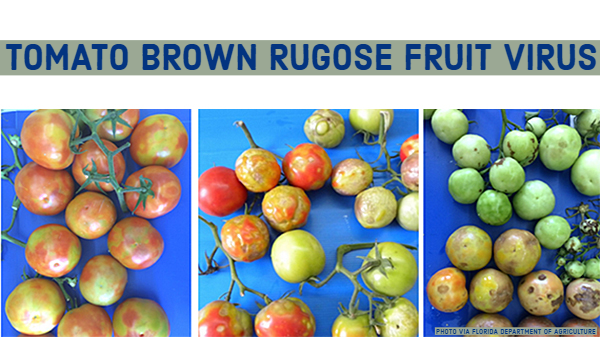PRESS RELEASE: Nogales, AZ – Authorities in the U.S., Mexico and Canada moved months ago to implement programs to limit the spread of a new tomato virus, ToBRFV, which is not a food safety threat to humans or animals.
The threat is not new and was identified in a California greenhouse in September of 2018 and also in May of 2019 in a greenhouse in Ontario, Canada, as well as in Mexico.
Because of the severe threat that the disease poses to tomatoes and peppers, authorities in all three nations have instituted programs to identify and eradicate the disease, which like many viruses spreads from touch.
According to agriculture authorities and university researchers across North America, contaminated seeds are a serious concern for transmission for the virus.
Responding to this threat, in 2018 Mexico put in place a regulatory seed testing program for tomato and pepper seed imported into the country.
Unfortunately, the coordinated public relations messaging from multiple Florida entities suggests there is an effort to use the issue for political gain to reduce imports of Mexican tomatoes and peppers, according to the Fresh Produce Association of the Americas.
“The USDA, SENASICA, the Canadian Food Inspection Agency and other government agencies are well aware of the threat that ToBRFV poses and their regulatory approach is based on sound science and not hyperbole,” said Lance Jungmeyer, President of the Fresh Produce Association of the Americas. BB #:144354 “The efforts from the US, Mexican, and Canadian governments have been initiated to address this issue.”
The virus spreads by hand, farm implement and other physical means. As such, the prospect of an infected tomato getting from the grocery store into a U.S. tomato producing field is minimal. This is why authorities have focused their efforts on eradication at the source.
Unfortunately, Florida Agriculture Commissioner Nicki Fried is using this issue in order to gain political points, she is not taking into account the fact that imported tomatoes are not likely to find their way to a Florida tomato field, and thus present minimal risk to the industry.
Nonetheless, Fried is calling for controls that are intended to promote a Florida monopoly of the winter tomato market in the US.
“If we are to use the logic of disallowing the sale of fruit from places that have plant disease, Florida citrus should not be exported out of the state because of the citrus greening disease (HLB) that decimates citrus crops,” Jungmeyer added.
Background: ToBRFV virus is a relatively new threat. It is important to state that this is NOT a food safety issue. ToBRFV affects tomato and pepper plants, plus a few weeds but not animals or people. ToBRFV was first identified in Israel in 2014 and has moved into Jordan, the EU and the Americas. In Mexico, agriculture agencies SADER and SENASICA began addressing the problem when ToBRFV was first identified last year and they have instituted a regulatory seed testing program for tomato and pepper seed imported into the country. Seeds are a serious transmission vector for the virus. Other vectors are by mechanical means (tools, hands, packaging, knives, closed irrigation systems, people and bumble bees.
About the Fresh Produce Association of the Americas:
The FPAA is a nonprofit trade association headquartered in Nogales, Arizona, that represents over 100 U.S. member companies involved in importing, sales and distribution of fresh fruits and vegetables grown in Mexico. The FPAA leverages the efforts of private companies and partner-associations to increase the consumption of fresh fruits and vegetable from Mexico.



